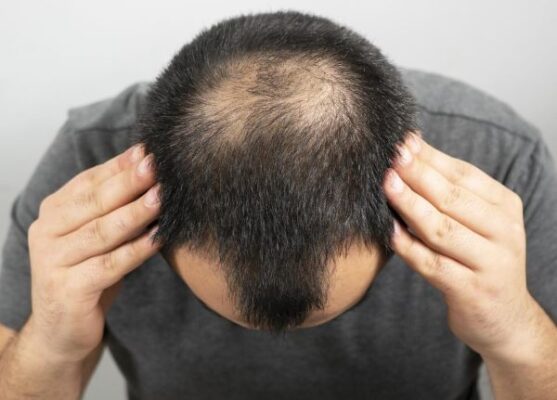Hair loss can be a distressing experience for many people, and it can be caused by a variety of factors, including genetics, age, and hormonal imbalances. One such hormonal imbalance that has been linked to hair loss is growth hormone deficiency. Research found that people with a deficiency in insulin-like growth factor-1 (IGF-1) and human growth hormone (hGH) have decreased hair growth compared to individuals without those hormonal deficiencies. Clinically, primary decreases in GH and IGF-1 have been associated with hair loss and alopecia. In this article, we will explore the relationship between growth hormone deficiency and hair loss, and how hormones play a significant role in hair growth. We will also discuss the effects of other endocrine disorders on hair growth and density.
Table of Contents
What is Growth Hormone?

Growth hormone (GH) is a peptide hormone secreted by the anterior lobe of the pituitary gland. It is also known as somatotropin or human growth hormone. GH stimulates the growth of essentially all tissues of the body, including bone, and is synthesized and secreted by anterior pituitary cells called somatotrophs. GH is vital for normal physical growth in children. GH prompts the liver to make a substance called insulin-like growth factor (IGF-1), which is involved in bone growth. GH also contributes to proper bone density, which is important in both childhood and adulthood. In adults, GH does not cause growth but helps to maintain normal body structure and metabolism, including helping to keep blood glucose levels within set levels.
Growth Hormone Deficiency and Hair Loss
Growth hormone deficiency can affect hair growth in several ways. Here is how it can impact hair:
- Hair Loss and Alopecia: Primary decreases in growth hormone (GH) and insulin-like growth factor-1 (IGF-1) have been associated with hair loss and alopecia. Patients with primary GH deficiency resulting from defective hormone binding and low IGF-1 levels may experience hair loss.
- Hormonal Abnormalities: GH deficiencies are often accompanied by other hormonal abnormalities, such as hypothyroidism and hyperprolactinemia, which are also known to affect hair growth. These hormonal imbalances can contribute to hair loss or thinning.
- Effect on Hair Growth: Studies have shown that growth hormone replacement therapy can significantly help body and facial hair growth in growth hormone-deficient individuals. This suggests that growth hormone plays a role in promoting hair growth.
- IGF-1 Deficiency: Individuals with IGF-1 deficiency and growth hormone deficiency may experience decreased hair growth compared to those without hormonal deficiencies. IGF-1 is closely related to growth hormone and plays a role in hair growth.

It’s important to note that hair growth is a complex process influenced by various factors, including genetics and hormonal balance. Growth hormone deficiency is just one factor that can affect hair growth. Consulting with a healthcare professional or endocrinologist is recommended for a comprehensive evaluation and appropriate treatment options. Do you know about these 20 Male Hormones Killing Foods.
Growth Hormone deficiency symptoms
The symptoms of growth hormone deficiency can vary depending on the age of the individual and the severity of the deficiency. Here are some common symptoms of growth hormone deficiency:
Symptoms in Children:
- Abnormally slow growth
- Short stature
- Delayed puberty
- Chubby body build
- Impaired hair growth
- Delayed tooth development
- Low blood sugar levels (hypoglycemia) in infants and toddlers
- A very small penis (micropenis) in newborns assigned male at birth
Symptoms in Adults:
- Reduced sense of wellbeing
- Anxiety and/or depression
- Decreased energy levels
- Increased body fat, especially around the belly
- Impaired hair growth
- Reduced muscle mass and strength
- Decreased bone density
- Impaired memory and cognitive function
It’s important to note that these symptoms may also be caused by other medical conditions, and a healthcare professional or endocrinologist should be consulted for a comprehensive evaluation and appropriate treatment options.
See also: Vitamin B12 Deficiency Cause Hair Loss
Other factors of hair loss besides Growth Hormone deficiency
There are several factors that can cause hair loss besides growth hormone deficiency. Here are some of them:
- Heredity: The most common cause of hair loss is heredity, which happens with aging. This condition is called androgenic alopecia or male-pattern baldness.
- Hormonal Changes: Hormonal changes can also cause hair loss. Androgenic alopecia is caused by a combination of genetic and hormonal factors, particularly the hormone called dihydrotestosterone (DHT). Hormonal imbalances such as hypothyroidism and hyperprolactinemia can also contribute to hair loss.
- Medical Conditions: Medical conditions such as autoimmune disorders like alopecia areata, iron-deficiency anemia, malnutrition, and rapid weight loss can cause hair loss.
- Medications and Treatments: Certain medications and treatments such as chemotherapy, radiation therapy, and some medications used to treat high blood pressure, depression, and arthritis can cause hair loss.
- Stress: Stress can cause hair loss, particularly telogen effluvium, which results in the loss of more than 200 scalp hairs per day.
- Nutritional Deficiencies: Hair loss may be caused by nutritional deficiencies or imbalances, which can impact both hair structure and hair growth. Sudden weight loss and poor diet can also contribute to hair loss.
- Cosmetic Factors: Certain hair treatments such as chemical relaxers, hair dyes, and hot oil treatments can cause hair loss.
- Childbirth: Hormonal changes during pregnancy can cause hair to become thicker and fuller, but after childbirth, hair can fall out due to hormonal changes.
- Internal Diseases: Certain internal diseases such as lupus, diabetes, and thyroid disorders can cause hair loss.
- Skin Problems: Skin problems such as psoriasis and seborrheic dermatitis can cause hair loss.
It’s important to note that hair loss is a complex process influenced by various factors, and it’s often a combination of factors that contribute to hair loss. Consulting with a healthcare professional or dermatologist is recommended for a comprehensive evaluation and appropriate treatment options.
See also: Weight Loss And Hair Loss
Can Growth Hormone deficiency hair loss reversible?
The reversibility of hair loss caused by growth hormone deficiency depends on the severity of the deficiency and the individual’s response to treatment. While growth hormone replacement therapy can help improve hair growth in individuals with growth hormone deficiency, it’s important to note that hair loss is a complex process influenced by various factors, and it’s often a combination of factors that contribute to hair loss. Therefore, it’s possible that other factors may also need to be addressed to fully reverse hair loss. In addition, natural methods such as reducing sugar intake, exercising regularly, getting enough sleep, reducing body fat, taking certain supplements, and reducing stress may also help improve hair growth. However, consulting with a healthcare professional or dermatologist is recommended for a comprehensive evaluation and appropriate treatment options.
See also: Can Food Allergies Cause Hair Loss?
Which hormone promotes hair growth?
There are several hormones that play a role in hair growth, including growth hormone (GH) and insulin-like growth factor-1 (IGF-1) [1,4]. GH operates as a neuroendocrine regulator of human hair growth ex vivo. Clinically, primary decreases in GH and IGF-1 have been associated with hair loss and alopecia. Androgen hormones, such as DHEA and testosterone, also play a significant role in overall hair growth. When the levels of these hormones decrease, it can lead to thinning hair and even hair loss. However, the majority of research is still ongoing, and the evidence so far is encouraging that HGH can restore hair, especially in patients with growth hormone deficiency. Furthermore, the replacement therapy significantly helped body and facial hair growth in growth hormone-deficient men.
How is Growth Hormone deficiency diagnosed?
Diagnosis of growth hormone deficiency involves a combination of medical history, physical examination, and laboratory tests. Here are some of the common diagnostic methods used to diagnose growth hormone deficiency:
- Auxology: Auxology is the study of human growth and development. It involves measuring height, weight, and other physical characteristics to assess growth patterns.
- Bone Age View: Radiographic assessment of bone age is used to determine the stage of skeletal maturation.
- Measurement of Insulin-like Growth Factor 1 (IGF-1) and IGF Binding Protein 3: IGF-1 and IGF binding protein 3 (IGFBP-3) levels are measured to assess growth hormone status.
- GH Stimulation Tests: GH stimulation tests are used to assess the pituitary gland’s ability to produce GH. These tests involve administering a substance that stimulates the pituitary gland to release GH, and then measuring the GH levels in the blood.
- Medical History: A thorough medical history is taken to identify any underlying medical conditions or medications that may be contributing to growth hormone deficiency.
- Physical Examination: A physical examination is conducted to assess height, weight, and other physical characteristics, as well as to identify any physical abnormalities that may be associated with growth hormone deficiency.
- Imaging Studies: Imaging studies such as X-rays may be used to assess bone density and skeletal maturation.
It’s important to note that the diagnostic process for growth hormone deficiency may vary depending on the age of the patient and the underlying cause of the condition. Consulting with a healthcare professional or endocrinologist is recommended for a comprehensive evaluation and appropriate treatment options.
Growth hormone deficiency and hair loss treatment
Treatment for growth hormone deficiency typically involves growth hormone replacement therapy. Here are some common treatments for growth hormone deficiency:
- Growth Hormone Replacement Therapy: Growth hormone replacement therapy involves injecting synthetic growth hormone into the body to replace the missing natural growth hormone. The dosage of the hormone is individualized based on the patient’s age, sex, and other factors. The therapy is usually long-term, often lasting for several years.
- Monitoring and Adjusting Dosage: During growth hormone replacement therapy, the child or adult needs to be regularly monitored by a healthcare professional to ensure the treatment is working. The healthcare provider may adjust the dosage of the medicine if needed.
- Surgery: In rare cases, surgery may be necessary to treat growth hormone deficiency. For example, if the deficiency is caused by a tumor on the pituitary gland, surgery may be needed to remove the tumor.
It’s important to note that growth hormone replacement therapy is not suitable for everyone and should be prescribed by a healthcare professional. The therapy may have side effects, and the benefits and risks of the treatment should be carefully considered before starting the therapy.
Alternative treatments for Growth Hormone deficiency
While growth hormone replacement therapy is the standard treatment for growth hormone deficiency, there are some alternative treatments that have been explored. However, it’s important to note that these alternative treatments may not have the same level of scientific evidence and effectiveness as growth hormone replacement therapy. Here are a few alternative treatments that have been mentioned in the search results:
- Sermorelin HGH Treatment: Sermorelin is a bioidentical growth hormone-releasing hormone (GHRH) that stimulates the pituitary gland to increase the production of human growth hormones. This treatment involves administering Sermorelin via injection, typically six days per week.
- Combination Therapy with Herbal Medicine: Some studies have explored the effectiveness and safety of combination therapy with herbal medicine and growth hormone compared to growth hormone monotherapy for short-stature children. However, more research is needed to establish the efficacy and safety of this approach.
It’s important to consult with a healthcare professional or endocrinologist before considering any alternative treatments for growth hormone deficiency. They can provide guidance and help determine the most appropriate treatment options based on individual circumstances and medical history.
How to improve Growth Hormone besides treatments and therapy
There are several ways to naturally improve growth hormone levels in the body. Here are some ways to boost human growth hormone (HGH) naturally:
- Reduce Sugar Intake: High insulin levels are known to lower the levels of growth hormone in the body. Reducing sugar and refined carbohydrate intake can have a big impact on HGH levels.
- Exercise Regularly: Exercise can increase HGH levels. The extent of this increase depends on the type and intensity of exercise, along with other factors. High-intensity exercises are most able to boost human growth hormone levels.
- Get Enough Sleep: HGH is released during deep sleep, so getting enough sleep is important for maintaining healthy HGH levels.
- Reduce Body Fat: The amount of belly fat you carry is directly related to your HGH production. Reducing body fat through diet and exercise can help improve HGH levels.
- Take Certain Supplements: Several natural supplements may increase the production of HGH, such as arginine, glutamine, and ornithine. However, more high-quality research is needed to establish the efficacy and safety of these supplements.
- Reduce Stress: Stress can lower HGH levels, so reducing stress through relaxation techniques such as yoga and meditation may help improve HGH levels.
- Eat a Balanced Diet: Eating a balanced diet that includes protein, healthy fats, and complex carbohydrates can help improve HGH levels.
It’s important to note that these natural methods may not have the same level of effectiveness as growth hormone replacement therapy and should not be used as a substitute for medical treatment. Consulting with a healthcare professional or endocrinologist is recommended for a comprehensive evaluation and appropriate treatment options.
Can Growth Hormone deficiency cause weight gain?
Yes, growth hormone deficiency can cause weight gain. Growth hormone plays a role in regulating body composition, and a deficiency in growth hormone can lead to an increase in body fat, particularly around the central part of the abdomen. Adults with growth hormone deficiency may report central weight gain, difficulty losing weight, and fatigue. However, it’s important to note that weight gain can also be caused by other factors, and a healthcare professional or endocrinologist should be consulted for a comprehensive evaluation and appropriate treatment options.
Conclusion
Research has shown that growth hormone (GH) and insulin-like growth factor-1 (IGF-1) play a significant role in hair growth, and primary decreases in GH and IGF-1 have been associated with hair loss and alopecia. Hormones, particularly androgenic hormones, also play a major role in hair growth, and when hormone levels drop, it can lead to thinning hair and even hair loss. GH deficiency can cause impaired hair growth, and GH replacement therapy has been shown to significantly help body and facial hair growth in growth hormone-deficient men. While the majority of research is still ongoing, the evidence so far is encouraging that HGH can restore hair, especially in patients with growth hormone deficiency. However, further clinical studies are needed to fully understand the relationship between growth hormone deficiency and hair loss.





One thought on “Growth Hormone Deficiency and Hair Loss”